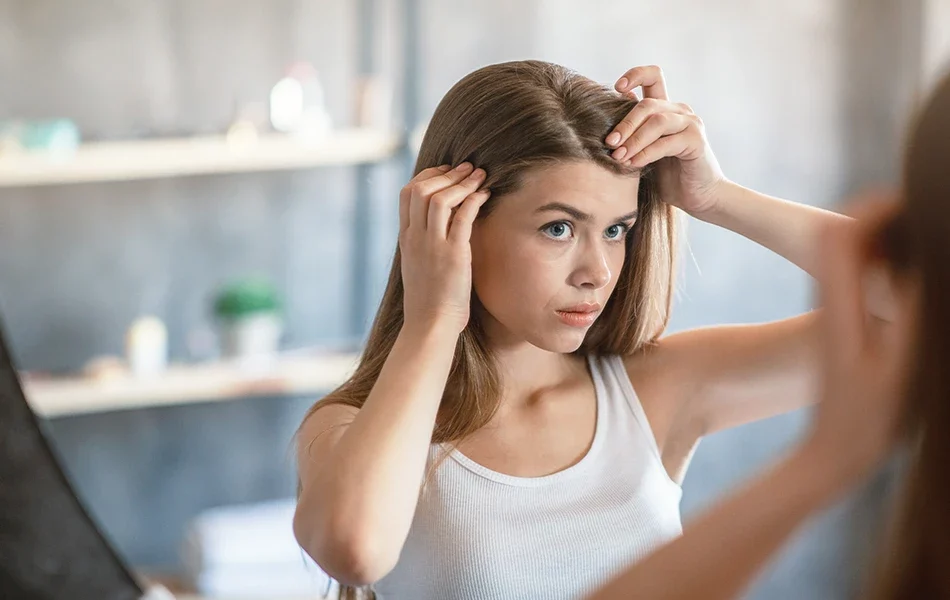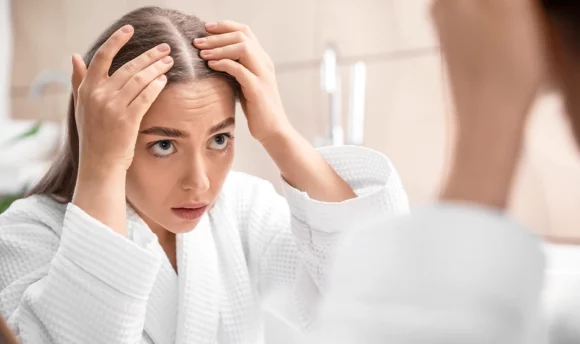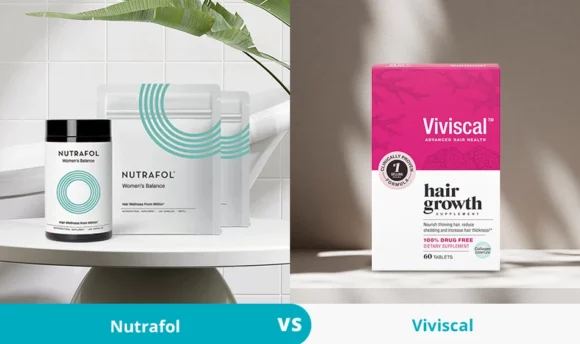Can Too Many Vitamins Cause Hair Loss? Striking a Balance
Discover the adverse effects of excessive vitamin consumption on hair health and learn how to achieve the ideal balance.

It’s a well-known fact that taking vitamins and minerals is essential for good health, including healthy hair growth. But did you know that too much of certain nutrients can cause hair loss?
It’s all about finding the perfect balance of vitamins and minerals. Let’s dive into the details of which nutrients to watch out for and some tips on how to treat hair loss caused by overconsumption.
Can Too Many Vitamins Cause Hair Loss?
The short answer is yes. Excessive intake of certain vitamins and minerals, such as vitamin A, vitamin E, and B vitamins, can cause hair loss.
Striking a balance in vitamin consumption is crucial to prevent hair loss and other health issues. If you’re experiencing hair loss, evaluate your diet and supplements to see if an excess of vitamins is the culprit.
Which Vitamins Cause Hair Loss?
Most vitamins are essential for healthy hair growth, especially vitamin A, vitamin E, and B vitamins, which are known to play a crucial role in maintaining a healthy scalp and hair.
However, overconsumption of these vitamins can lead to hair loss by triggering a condition known as telogen effluvium – stress-induced hair thinning.
Note: All Recommended Daily Allowance (RDA) amounts mentioned below are based on the daily requirements for the average adult leading a normal lifestyle.
#1 Vitamin A
Vitamin A is essential for eye, skin, and hair health. However, excessive consumption of this vital nutrient can lead to hair loss.
A study has revealed that too much vitamin A can cause hair follicles to shrink and eventually fall out. This toxic buildup in the body may lead to the shedding of hair strands, brittle nails, or dry skin.
Vitamin A is a fat-soluble vitamin, meaning it dissolves in fats and oils and can be stored in the body’s fat tissues. It is found in lots of delicious foods, like sweet potatoes, carrots, spinach, and pumpkin.
The RDA for adults is 900 micrograms for men and 700 micrograms for women. If you take nutritional supplements, make sure that the dosage does not exceed this recommendation.
Some common early signs of vitamin A toxicity include headache, nausea, drowsiness, dry eyes, cracked lips, and sparse chunks of hair.
#2 Vitamin E
Vitamin E is an antioxidant that’s essential for healthy skin and hair by reducing oxidative stress and the presence of free radicals. However, excessive consumption of vitamin E can interfere with blood clotting and lead to thinning hair.
It is worth noting that vitamin E toxicity is relatively rare and typically requires high doses exceeding the upper limit of 1,000mg per day.
Foods rich in vitamin E include almonds, sunflower seeds, avocado, spinach, and broccoli.
Vitamin E has an RDA of 15 milligrams.
Some early symptoms of excess vitamin E consumption include muscle weakness, fatigue, nausea, and diarrhea.
#3 B vitamins
B vitamins play an important role in promoting healthy hair growth by supporting the production of red blood cells and the delivery of oxygen and nutrients to hair follicles.
However, overconsumption of these vitamins can lead to an imbalance of nutrients in the body, which can cause hair thinning and even hair loss. Specifically, too much vitamin B6 can cause nerve damage and hair loss, while too much B9 (folate) can mask a vitamin B12 deficiency, which can also cause hair loss.
Another study demonstrated that high doses of vitamin B6 could cause female pattern hair loss due to interference with hair follicle production.
Good food sources of vitamin B6 include chickpeas, salmon, potatoes, and bananas, while vitamin B12 is found in animal products such as meat, fish, and dairy. Vitamin B6’s RDA is 1.3 milligrams, while that of vitamin B12 is 2.4 micrograms.
Early signs of Vitamin B6 toxicity include nausea, sensitivity to light, and numbness. On the other hand, itching, joint pain, and heart palpitations could signal excessive amounts of vitamin B12.
Which Minerals Can Cause Hair Loss?
Hair loss is usually caused by a combination of factors, not just a mineral deficiency. In some cases, excessive intake of certain minerals or supplements can also contribute to hair loss.
#1 Zinc
Zinc helps maintain the structure of hair follicles and promotes hair growth. A study found that zinc supplementation improved hair growth in patients with telogen effluvium.
A lack of zinc in your diet can cause hair loss, brittle hair, or slow growth; conversely, an excessive intake of zinc may also result in loss of hair thickness.
The recommended daily intake of zinc is 8–11mg. Good sources of zinc include shellfish, red meat, poultry, beans, nuts and seeds, whole grains, and dairy products. A varied and balanced diet can help ensure that you meet your daily zinc needs.
Some early symptoms of zinc toxicity may include nausea, vomiting, epigastric pain, lethargy, and fatigue.
#2 Selenium
Selenium helps keep hair follicles strong and promotes hair growth.
However, an excessive intake of selenium can lead to a condition called selenosis, which is characterized by symptoms such as hair loss, nail brittleness, and skin rashes.
This occurs because selenium is a trace mineral, and excessive amounts can accumulate in the body’s tissues, leading to toxicity.
Food sources of selenium include Brazil nuts, seafood, poultry, eggs, and mushrooms. The RDA of selenium for adults is 55 micrograms.
Some symptoms of selenium toxicity are severe irritations of the respiratory system, metallic taste in the mouth, nasal congestion, signs of rhinitis, and pulmonary edema.
#3 Iron
Iron plays a crucial role in carrying oxygen to hair follicles and stimulating new hair growth.
However, excessive intake of iron can lead to a condition called iron overload or hemochromatosis, which causes an excessive accumulation of iron in the body tissues. Iron overload can damage your hair follicles and result in hair thinning or even hair loss.
Iron’s RDA is 18mg/day. Good food sources of iron include red meat, poultry, seafood, beans and lentils, tofu, tempeh, dark green leafy vegetables, nuts and seeds, and fortified cereals and grains.
Early signs of excessive iron intake include stomach pain, fatigue, joint pain, headaches, and skin color changes.
#4 Magnesium
Magnesium supports hair follicles and keeps your hair healthy. It also plays an important role in protein synthesis, which is essential for hair growth.
An excessive intake of magnesium can lead to mineral imbalances in the body. It can interfere with the absorption of other essential minerals like calcium and zinc, which are crucial for maintaining the healthy growth of your hair.
In addition, excessive magnesium intake can lead to diarrhea and malabsorption, which can further contribute to mineral imbalances and cause hair loss.
Magnesium-rich foods include leafy greens, nuts, seeds, legumes, whole grains, dairy, and dark chocolate. The RDA of magnesium ranges from 310–420mg per day.
Common symptoms of magnesium overload are diarrhea, nausea, muscle weakness, and irregular heartbeat.
#5 Copper
Copper helps keep healthy hair follicles and promotes melanin production – responsible for hair color – through proper nutrition.
An excessive intake can interfere with the absorption of other essential minerals, such as zinc and iron, leading to a deficiency in these minerals, which can ultimately result in hair loss.
Additionally, copper toxicity can damage the liver and kidneys, which play crucial roles in keeping your hair healthy. Therefore, it is essential to consume copper in moderation.
Some food sources of copper include shellfish, organ meats, nuts and seeds, legumes, dark chocolate, mushrooms, and leafy greens. The RDA of copper for adults is 900 micrograms per day.
Some early indications of copper toxicity intake include abdominal pain, nausea, headaches, fatigue, weakness, and jaundice.
How to Treat Hair Loss Due to Excess Vitamin and Mineral Intake?
If you believe you’re experiencing hair loss due to excessive vitamin or mineral intake, you may want to evaluate your vitamin intake from both your diet and supplements to determine if an excess amount of vitamins is the underlying reason for any problems.
Here are some steps you can take to address the condition:
#1 Alter your diet
The initial step to treating hair loss due to excessive vitamin or mineral consumption is changing your diet. If you have been taking supplements, discontinue them and get all your vitamins and minerals from food instead.
Aim for a balanced diet with plenty of fruits, vegetables, lean protein sources, and whole grains as the primary components.
#2 Review your supplement dosages
Taking too many supplements can be harmful to your health. Always double-check the dosage and make sure it does not exceed recommended daily intake. If it does, reduce dosage or discontinue use altogether.
It’s also important to note here that supplements are only necessary if you don’t reach your daily amounts with food. You should not take supplements unless blood analysis shows that or a doctor has prescribed them to you.
#3 Evaluate your haircare routine
Review your current routine to make sure you’re not using products that could damage your locks. Avoid harsh chemicals or hot tools that can weaken the structure of your locks, making them more susceptible to breakage.
Instead, try incorporating scalp massages, hair growth products, and natural oils like coconut, jojoba, and argan oil into your routine to promote the healthy growth of your hair.
FAQs
Vitamin D is essential for healthy hair growth, but too much can be harmful. Fortunately, it’s rare to get too much vitamin D from your diet alone. If you do take supplements, be sure to follow the recommended dosage to avoid negative side effects.
Yes, consuming excessive amounts of specific vitamins can disrupt the natural balance of the scalp and result in hair shedding and breakage. It’s essential to maintain a proper balance and not exceed the recommended daily intake levels.
Yes, it is true that vitamin deficiency can cause hair loss. Many cases of this condition are due to a deficiency of certain vitamins, such as vitamin D, vitamin B12, and vitamin B7.
A Word From a Trichologist
Balance is key when it comes to combating hair loss caused by vitamin overconsumption. Although getting adequate amounts of vitamins and minerals is necessary for hair health, taking too many can have negative side effects that can lead to hair loss.
A balanced and nutritious diet that includes fruits, vegetables, whole grains, lean proteins, and healthy fats is essential for optimal hair health. It is recommended to consult a qualified nutritionist when choosing supplements to obtain essential minerals.
When purchasing haircare products, look for those that contain essential vitamins and minerals such as biotin, niacin, and vitamin E to nourish and strengthen hair. Keep in mind, however, that overuse can also cause product buildup, which can lead to clogged follicles.
Some pro tips for maintaining luscious locks include reducing stress, getting enough rest, and steering clear of harsh chemical treatments and heat styling tools. Regular massaging of the scalp and practicing good hair hygiene habits can promote the healthy development of your hair.
Consult a healthcare professional or trichologist to identify the root cause and create a tailored treatment plan.
Conclusion
Vitamins are essential for the healthy development of your hair, but taking too many of them could have adverse effects. Specifically, consuming too much of vitamins A and E, as well as minerals like selenium, copper, and iron, can have adverse effects on hair health.
It’s essential to strike a balance and take these nutrients in moderation. You can take steps to treat hair loss, such as improving your overall health, altering your diet, reviewing nutritional supplements, and your haircare routine.
If you suspect you have a vitamin deficiency or feel as though you are taking too much, speaking with a doctor or nutritionist may be beneficial. Prioritizing your hair’s health is essential.

















































 Select your language:
Select your language: 








